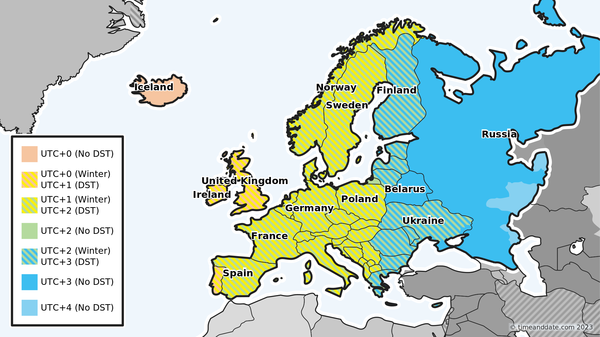Europe Start DST 2025
Most European countries will spring forward one hour on Sunday, March 30, 2025, as Daylight Saving Time (DST) starts.


Europe sets clocks forward an hour on March 30, 2025—don’t forget to adjust yours.
©mungfali.galihkartiwa07.workers.dev
When Do Clocks Change in Europe?
Most European countries will set their clocks forward one hour at 01:00 UTC on March 30, 2025. The local time of the change depends on each time zone.
Since Europe spans several time zones, the switch from standard time (also known as winter time or normal time) to summer time occurs at different local times—see table at the bottom of the page for more details.
Clocks will go back to standard time on Sunday, October 26, 2025.
Check your local time for the Europe DST start 2025
Shorter than in the US and Canada
In the US and Canada, DST begins a few weeks earlier, on March 9, 2025.
DST in Europe is 21 or 28 days shorter than in the US and Canada, depending on the year.
Efforts to End DST in the EU Have Stalled
In 2019, the European Parliament backed a proposal from the European Commission to abolish DST in EU member countries. However, by 2021, the proposal had stalled in the European Council due to practical challenges in its implementation. There hasn’t been any significant progress on the matter in recent years.
Europe’s time zones and DST schedule
In 2024, some 67 Members of the European Parliament (MEPs) renewed efforts by urging the European Commission to revisit the issue, highlighting health risks and questioning the contemporary relevance of DST.
Possible Change in Ukraine
In July 2024, Ukraine’s parliament passed a law to eliminate the annual shift to DST. Although Ukraine is part of Europe, it is not a member of the European Union.
At the time of publishing this news story, the new law’s status remains “The law has been sent to the President of Ukraine for signature.” This status is still dated August 21, 2024.
Daylight Saving Time in Europe
European countries coordinate their time changes. Under current EU law, DST starts on the last Sunday of March and ends on the last Sunday of October.
Countries that follow DST include:
- The European Union (EU), including Bulgaria, France, Germany, Italy, Poland, and Spain.
- Most other European countries, such as the United Kingdom, Norway, and Switzerland.
Countries that do not have DST include Russia, Iceland, and Belarus.
Local Times in Europe for DST Start
| Time Zone During DST | DST Starts | Standard Time Zone (no DST) |
|---|---|---|
|
British Summer Time (BST), used in the UK during summer. UTC offset: +1 hour |
DST starts at 01:00 (1 am) local time. |
UTC offset: None |
|
Irish Standard Time (IST), used in Ireland during the summer. UTC offset: +1 hour |
DST starts at 01:00 (1 am) local time. |
UTC offset: None |
|
Western European Summer Time (WEST), used in the Canary Islands, the Faroe Islands, and Portugal. UTC offset: +1 hour |
DST starts at 01:00 (1 am) local time. |
UTC offset: None |
|
Central European Summer Time (CEST), used in countries including Austria, France, Germany, Italy, Hungary, Norway, Poland, Spain, and Switzerland. UTC offset: +2 hours |
DST starts at 02:00 (2 am) local time. |
UTC offset: +1 hour |
|
Eastern European Summer Time (EEST), used in countries including Bulgaria, Estonia, Finland, Greece, Latvia, Lithuania, and Romania. UTC offset: +3 hours |
DST starts at 03:00 (3 am) local time. |
UTC offset: +2 hours |